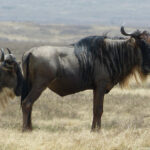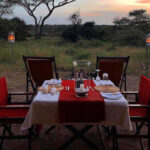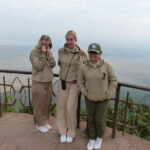Understanding Currency for Safari with Rolux Safaris & Trekking
When planning a safari with Rolux Safaris & Trekking, it’s essential to understand the currency used in the destination country. Most African countries use their local currencies, such as the Kenyan Shilling, Tanzanian Shilling, or South African Rand. It’s wise to carry some cash in the local currency for small purchases and tips. However, U.S. dollars are also widely accepted in many areas. Make sure your bills are in good condition and from recent years, as older or damaged notes might not be accepted.
Before your trip, it’s beneficial to know the current exchange rates. You can find this information online or through currency exchange apps. Knowing the rates helps you budget and prevent overpaying for goods and services. For larger transactions, like booking excursions or accommodations, using a credit card can be convenient. Just make sure to notify your bank of your travel plans to avoid any issues.
ATMs are available in most major cities and some towns, allowing you to withdraw local currency directly. It’s a good idea to withdraw cash as needed to avoid carrying too much money. Additionally, some ATMs may charge a withdrawal fee, so it’s best to check with your bank beforehand. Travelers should always have a mix of cash and cards to handle different situations.
Bargaining is a common practice in many African markets. When shopping for souvenirs or gifts, don’t hesitate to negotiate the price. Start by offering a lower price than what the vendor quotes and gradually work your way up. This can help you get a fair deal without spending too much. Remember, bargaining is both an art and a cultural experience, so enjoy the process and be respectful.
Choosing the Best Currency to Bring
Selecting the right currency for your safari with Rolux Safaris & Trekking is important for a smooth travel experience. Local currencies such as the Kenyan Shilling or Tanzanian Shilling are often preferred for smaller transactions. Carrying a small amount of U.S. dollars can also be useful as they are widely accepted. However, ensure your dollar bills are in good condition and not too old. Some establishments may refuse bills that are damaged or pre-2006.
When deciding how much cash to bring, consider the length of your stay and the activities you plan to do. Pre-paying for services like hotels and tours can reduce the amount of cash you need to carry. It’s advisable to have smaller bills for tips and street market purchases. You can also check if your accommodations offer a safe for storing extra cash. This helps in securing your money and using it wisely.
Using a credit card for larger purchases is convenient and safer than carrying large sums of cash. Credit cards are widely accepted in established businesses, hotels, and restaurants. Ensure your card allows international transactions to avoid any issues during your trip. Always inform your bank of your travel plans to prevent any unexpected blocks on your card. Additionally, be aware of any foreign transaction fees your card might incur.
If you run out of cash, ATMs are available in most cities and tourist areas. They allow you to withdraw local currency directly and often have fair exchange rates. However, fees may apply, so it’s good to check with your bank before departure. Always have a backup plan, like keeping some emergency cash hidden separately. Being prepared with the right mix of currencies and payment methods ensures a stress-free safari.
Exchange Rates and Their Impact on Your Budget
Exchange rates can significantly affect your safari budget with Rolux Safaris & Trekking. Knowing the current rates before you travel can help you plan better. Exchange rates dictate how much local currency you receive for your money. If the rate is unfavorable, you might get less value for your currency. This makes it essential to monitor rates and exchange money when the rates are favorable.
Using currency exchange services at airports or hotels can be convenient but often come with higher fees. It’s usually better to exchange money at local banks or use ATMs for better rates. Comparing different exchange points can save you money. A small difference in rates can add up, especially if you plan to spend a lot. Always check the fees associated with each method to avoid unexpected costs.
Besides impacting the amount of cash you have, exchange rates also affect card transactions. When you use a credit card, transactions are processed at the current exchange rate. This can either be beneficial or costly, depending on the rate at the time of purchase. Be aware of any foreign transaction fees your card might charge, as these can also influence your overall budget. Cards with no foreign transaction fees are ideal for international travel.
To manage exchange rate fluctuations, consider bringing a mix of cash and cards. Having some local currency on hand protects you from sudden changes in rates. Keeping track of your spending and remaining budget is crucial. Apps and online currency converters can help you stay updated on current exchange rates. This ensures you can adjust your finances accordingly and enjoy your safari without financial stress.
ATMs and Bargaining Tips: Navigating Financial Transactions on Safari
Access to ATMs during your safari with Rolux Safaris & Trekking can make managing cash easier. Major cities and tourist areas typically have several ATM options. However, rural areas may have limited or no ATM access. It’s wise to withdraw enough cash when you are in cities. Always check ATM fees to avoid extra charges.
Your bank might charge fees for international withdrawals, so it’s best to confirm the costs before you travel. Some travelers prefer using ATMs to get local currency because they often offer better exchange rates. Remember to have a backup plan, like keeping some emergency cash in case ATMs are unavailable. Keep your withdrawal receipts for easy tracking of your expenses. Avoid withdrawing too much at once to minimize the risk of loss or theft.
- Check ATM availability in advance
- Plan withdrawals in major cities
- Monitor ATM and bank fees
- Keep withdrawal receipts
Bargaining is a skill that can help you save money while shopping on safari. Start with a lower offer than the vendor’s price and negotiate slowly. Knowing the average prices of items you’re buying can give you an advantage. Keep the atmosphere friendly and respectful to achieve the best results. Remember, bargaining is expected and part of cultural experiences in many markets.
Approach bargaining with a positive attitude and see it as a fun interaction. Vendors expect it and enjoy the process, so don’t be afraid to participate. Begin with a smile and make your first offer about 20-30% lower than the asking price. Pay attention to body language and be ready to compromise. The goal is to reach a price both you and the seller agree on.
Here are some additional tips for successful bargaining:
- Research common prices beforehand
- Keep small bills for easy transactions
- Remain polite and friendly
- Walk away if the price isn’t right
The Art of Negotiating Bills
## Conclusion
Budgeting for a safari involves thoughtful planning around currency, ATM access, and mastering the art of bargaining. By understanding local currencies and monitoring exchange rates, travelers can ensure they get the best value for their money.
Utilizing ATMs wisely and carrying a mix of cash and cards will provide flexibility and security. Embracing local customs like bargaining not only helps save money but also enriches the overall travel experience.













